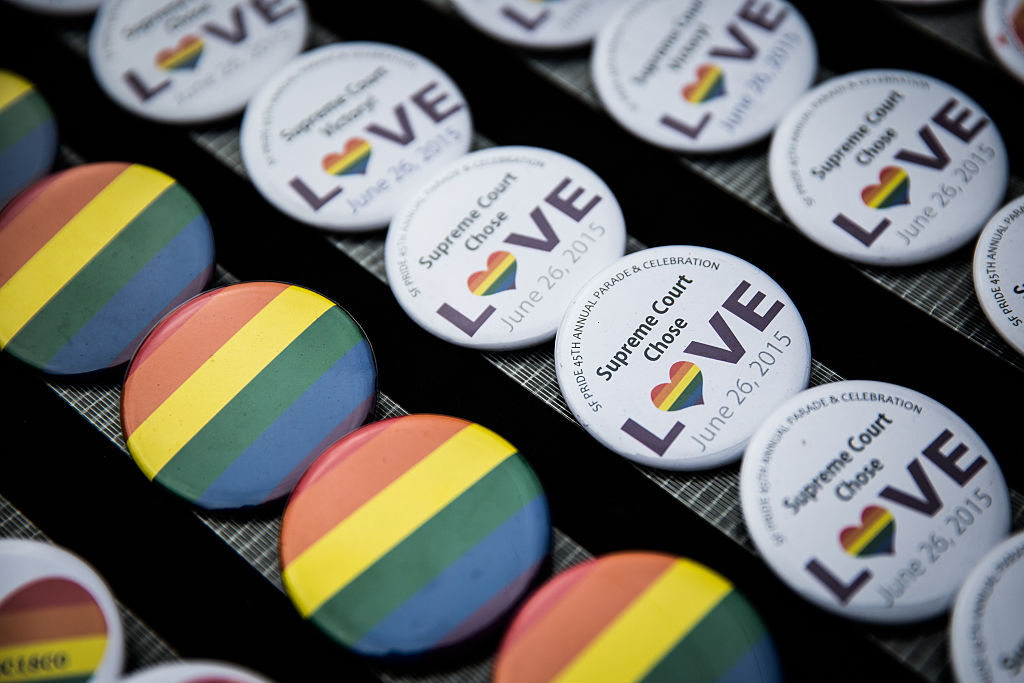How Gay Marriage Is Under Threat in the Trump Era

What a difference a few months make. Just before Donald Trump returned to office in January, gay marriage was thought to be settled law in the United States. After all, it was only 10 years ago that the U.S. Supreme Court declared gay marriage a constitutionally-protected right with its landmark decision on Obergefell v. Hodges. But a flurry of executive orders targeting the LGBTQ community casts a big shadow over the future of gay marriage.
[time-brightcove not-tgx=”true”]On Jan. 25, his first day in office, Trump signed an executive order that declared: “It is the policy of the United States to recognize two sexes, male and female.” Soon after, Trump blocked trans women from participating in female sports and the Pentagon banned trans people from serving openly in the military. U.S. park services then deleted LGBTQ references from national landmarks such as Philadelphia’s Independence Hall, the site of some of the earliest gay rights protests. The Trump Administration followed that by canceling $800 million in grants that research LGBTQ health and shutting down a national suicide hotline catered to LGBTQ youth.
But how endangered is gay marriage under Trump? Gay marriage activists and their allies take comfort in the high support that gay marriage enjoys among the American public. According to a Gallup poll from May, more than two in three Americans support it, and nearly as many say gay or lesbian relations are morally acceptable. Gallup also noted that a majority of Americans have backed gay marriage since the early 2010s.
It is a testament to these sentiments that the U.S. Congress enacted the Respect for Marriage Act (RMFA) in 2022 with broad bipartisan support. This law recognizes the legality of gay marriage for federal purposes, such as allowing same-sex couples to file a joint tax return. It also requires that states accept same-sex marriage licenses issued by another state.
But neither these protections nor the polls should create a sense of complacency. Support for gay marriage among Americans is decreasing not increasing. The 69% support that gay marriage garnered in May is below the 71% recorded in 2022 and 2023. A majority of Republicans also once again oppose gay marriage, with support dropping 14 points since 2022.
Contrary to public perception, the RMFA did not codify Obergefell into law. RMFA primarily allows for federal recognition of gay marriage, by repealing the odious Defense of Marriage Act (DOMA), which was enacted in 1996 at the peak of the moral panic over gay marriage orchestrated by the Christian right. DOMA prohibited federal recognition of gay marriage even if the marriage was conducted in a state that had legalized it.
Consequently, if Obergefell were to be nullified, the RMFA will protect federal recognition of gay marriage. But it will not prevent the reactivation of dozens of gay marriage bans erected across the U.S. prior to 2015, most of which are still in the books. Nor will the RMFA prevent states from erecting new legal barriers. In fact, the legislation exempts nonprofit religious organizations from providing “any services, facilities, or goods for the solemnization or celebration of marriage.” All of this explains why the RMFA got a chilly reception among gay rights activists.
Until recently moribund, the anti-gay marriage movement is also showing signs of life. It has been re-invigorated by Dobbs v. Jackson Women’s Health Organization, the 2022 U.S. Supreme Court decision that ended 50 years of legalized abortion in America. In comments that delighted gay marriage foes and alarmed gay marriage activists, Justice Clarence Thomas said the Court should also “reconsider” past rulings on same-sex marriage and contraception.
Just this month, the annual conference of the Southern Baptist Convention, the largest Protestant denomination in the U.S., called for an end to gay marriage. The move echoes ongoing efforts by half a dozen Republican-controlled states to undermine gay marriage.
Yet other states are fighting back. Democratic legislators in Virginia and Oregon are working to repeal laws and constitutional amendments prohibiting same-sex marriage that could in theory be resuscitated should Obergefell be overturned.
Meanwhile, the revived debate about gay marriage offers an opportunity to reframe the issue. During the 1990s, gay marriage activists embraced the view that it was a civil rights matter, noting some 1,000 marriage benefits only available to straight couples. But this framing backfired by coming across as legalistic and materialistic. After several setbacks, especially California’s Proposition 8 in 2008, gay activists pitched a new framing of “love and commitment.” While this narrative boosted support for gay marriage, its modesty meant that a big opportunity was missed to make a more transformative impact on societal attitudes toward LGBTQ people.
Going forward, gay activists should frame gay marriage as something morally sound and intrinsically good. For one thing, the apocalyptic predictions that social conservatives made about gay marriage—from the advent of another Civil War to the disappearance of straight children to the end of marriage itself—never came to pass. There is also now a wealth of data that highlights the benefits of gay marriage for the gay community and society as a whole.
In the 10 years since Obergefell became the law of the land, it is clear that gay marriage has been good for the American gay community, and perhaps even better for America at large. It would be a national shame and a massive setback for LGBTQ equality were it to be revoked.



